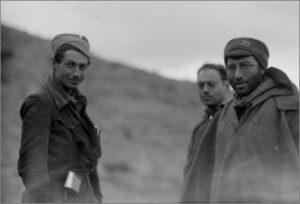Transmissions on the Long Trek by unattributed

Transmissions: Harry Fellman, John Rossen and Harry Perlman, March 1938; Harry Randall: Fifteenth International Brigade Films and Photographs; ALBA PHOTO 011; Series C: Group Portraits, September 1937-August 1938; 11-1049;
Tamiment Library/Robert F. Wagner Labor Archives
Elmer Holmes Bobst Library
70 Washington Square South
New York, NY 10012, New York University Libraries.
The Volunteer for Liberty, Vol. 2, No. 20, May 25, 1938, p. 3.
“Halto!”
“Manos arriba!”
“Que Brigada?”
We of the Transmisiones are becoming expert in replying to these gambits. At Belchite, Lecera, Albalate and Caspe we learnt our lesson, and the fruits were shown in this latest march from Batea. Out of 78 effectives 68 have returned to our ranks. It is said that less than half of our number have not at one time or another been accosted more or less violently, at more or close quarters, by the fascists patrols.
It must be admitted that the Spaniards have it all over usInternationals when it comes to threading their way through the mountains. The way they follow the paths is uncanny. On this last march I was fortunate enough to find myself among a group of Spaniards. We made a remarkable speed. The fascists hadn’t a chance. All they could manage was five or six despairing shots as we passed over a crest. They never got within hailing distance.
Others were not so lucky. Two comrades asked the way to Gandesa of some ammunition carriers loading burros.
‘___ vosotros? De Que Brigada?”
“De la Qunice.”
“Oh, Rojos!”
The comrades were conducted in the direction of Villalba until rounding a bend there appeared six figures carrying rifles.
“Que Brigada?”
“La Once, — vosotros?”
But the fascists were ready for that one.
“Estamos de la Quince,” they said, and faded away into the shadows, enabling our two comrades to proceed to Gandesa.
Even worse was the case of Comrade C. After running into a fascist patrol, who knocked his hat off with a bullet, he had to spend three days in fascist territory, making his way past Villalba where he drank water with the fascists at a well, past Asco here he heard the screams of women and children “greeting” the “National” Army, and finally crossing the Ebro by means of a ferry, Comrade C, says that the fascists call each other “hermano” — which is a good one to remember.
Our adjutant and 8 other comrades came across a company of men resting on top of a hill. They were about to enquire the identity of the troop when they heard somebody remark “They look like Reds.” There seemed to be no escape. One of our comrades, however, rose to the occasion. He approached the sergeant of the company and asked for a light. On being asked to what unit he belonged, he answered casually “Transmisiones” — and indicated their equipment. This apparently satisfied the sergeant. Our comrades moved away, mingling in the darkness with the fascist rank and file, and sitting down beside them. Eventually the fascist company moved on. The Transmisioniste made no haste to pick up their equipment — until the last of the company had passed around the corner.
But we Transmissionists didn’t spend all our time and energy in saving our own bodies. We also had our equipment to safeguard — our telephones, our centrals, our wire — and without a camion. We consider that we managed that pretty well too. Out of 18 telephones we saved 14. Out of 6 centrals we saved everyone, and we saved about 75% of our wire — a very considerable improvement on our performance at Belchite and Caspe. In addition we have succeeded in rescuing substantial quantities of equipment abandoned by other Transmission units. The final result is that we are considerably better off than when we started, so far as equipment is concerned.
The Transmissionist must conserve his telephones as the infantryman conserves his rifle. But it cuts both ways, for there are many occasions when the telephone conserves the Transmisionist.














